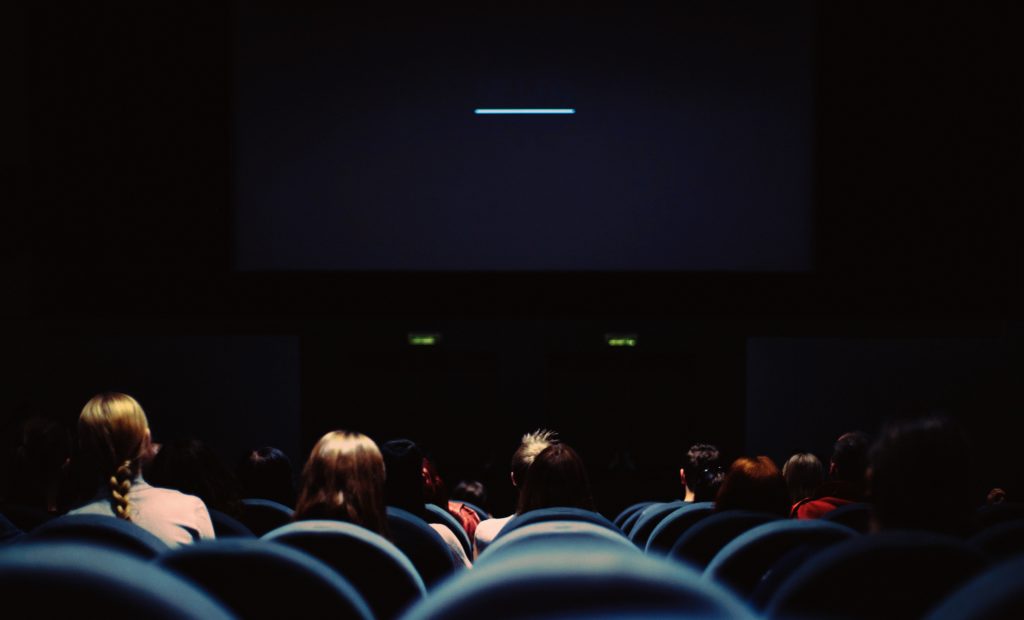Five or six guests are at the dinner party on the screen. They’re all talking at once except the woman, who’s quiet. She’s looking at the man across from her. He’s engaged in a hardy debate but he double-takes and catches her eye. She smiles and winks and he carries on.

by Erik Witsoe
There’s a clatter of plates as time passes and we find her in the kitchen doing dishes. Two of the guests, the oldest-looking couple, are in the hallway, waving goodbye. She calls out, “See ya next time” from the sink and scrubs some forks and a knife. She stops for a moment, the water still running, to take off her ring. She drops it onto a little plate in the open cupboard and keeps at the dishes. The man she winked at closes the front door behind his friends. He walks into the living room and pours some whiskey in a mason jar. He hands it to the last remaining guest.
We’re in one of those old theatres that plays small-run, festival films. We’ve watched four shorts, had an intermission, and watched three more. This is the last short film of the night.
A close-up of wine pouring into a glass. The wife is sitting with her husband and their friend. He’s just moved back. Toronto was fine. He’s glad to be home.
“Let’s make a deal,” the friend says. “This year, each of us has to do something that scares us.” The couple hesitates.
“Like what?” Asks the wife.
“See it can be anything you want. Big or small. But it’s gotta be something you’re afraid to do.”
“What’s yours gonna be?”
“I don’t know yet.”
“Well you’ve obviously thought about it,” the husband chimes in.
“I just think it’ll feel good, to do something that scares me.”
“Well, like what?” The wife asks again.
“I don’t know . . . Skydiving! I’m afraid of heights, I’ll skydive.”
The wife and the friend laugh. He finishes his whiskey. The husband’s glass is full.
The screen goes black and we hear a whistle like the wind. A plane flies through the air but the audio is detached, like we’re listening to what’s happening inside even though we’re viewing it from the ground.
“I’m gonna count down from three and then we’re gonna jump,” a voice cuts through the howl. “Three – two – one!”
We see a little speck across the sky. It drops down and out the bottom of the frame.
My wife lets go of my hand and rolls her eyes. I’ve known her long enough to know why. They didn’t have the budget to really jump out of the plane and she doesn’t appreciate the trick. She thinks it’s unimaginative and cheap. I only notice stunt doubles in bad wigs. She sees through it all.
The couple is sitting in a car, waiting. It’s shot from the side to avoid the look of car scenes in sitcoms. The sun pours through the passenger window. She asks her husband if he knows what he’s going to do yet. He shakes his head. She can’t think of anything either. She was thinking acid but drugs don’t scare her as much as they used to. They see something in front of them and get out of the car. Their friend is excited. They congratulate him and he gives them both hugs. He’s still wearing the one-piece, zip-up suit from his jump.
A long, black screen.
We come back to their house, alone with the husband for the first time. He’s distraught, an empty jam jar on the table. He’s reading over a letter with a pen in his hand. Then the sound of a key in the door. His wife enters.
His mouth opens then closes.
“You’re home,” he says.
“Yeah, I got off early. What’s all this?”
There are boxes in the room and a few bare shelves.
“I don’t know how to say it…”
“How to say what?”
He has some trouble breathing. The acting is impressive. He picks up the letter and reads. His hands are shaking.
“Ever since we decided to do something that scared us I realized the thing that scares me most is leaving. At first, I tried to put the thought out of my head. Of course that would be scary, I’d have to start over. But the thought won’t go away.” He’s no longer reading, he’s just speaking. “I’m not happy. Leaving you is scary. I think I have to.”
“Is that supposed to be like it’s-not-you-it’s-me?” Her voice is gravelly.
“I guess. Yeah. But it really is.”
“So he skydived and you’re, I guess, asking for a divorce?”
The husband doesn’t answer. He just sits quietly.
My wife clutches her hands. She rubs the ring on her finger, turning it opal-side down. She can feel something worse coming.
“Well that just leaves me. Let’s each of us do something that scares us,” says the on-screen wife.
Her husband looks to the ground, unsure. She walks purposely into the kitchen. He gets to his feet and follows her into the room.
“Look, this isn’t about the game, it’s –”
But he can’t finish. She turns around quickly and the two of them are standing close. The camera jumps several times, higher and higher, looking down on the couple from out of a corner. He gasps and takes a step back. His left hand, missing its wedding ring, reaches up to the kitchen knife buried in his stomach. He falls to his knees. A close-up of her face, frightened and surprised. The piano music begins again, this time not in the room at all, but laid over top of the film. The screen goes black for a long time.
We sit still until the credits start. My wife keeps rubbing her ring. I realize she’s holding her breath. The credits play all the way through and she still doesn’t look at me. She’s examining somewhere just above the dark screen when I finally stand up and take her hand. We’re the last ones out of the theatre. When you’re dating, that speeds your heart. When you’re married, it makes you sigh. I ask her how she liked the movie and she says the acting was stiff and the plot was telegraphed. She doesn’t look at me the entire walk home. I hold her hand and wonder what I’m going to do.
